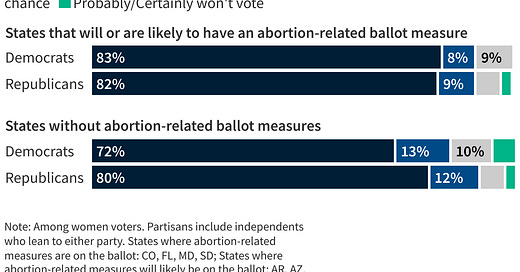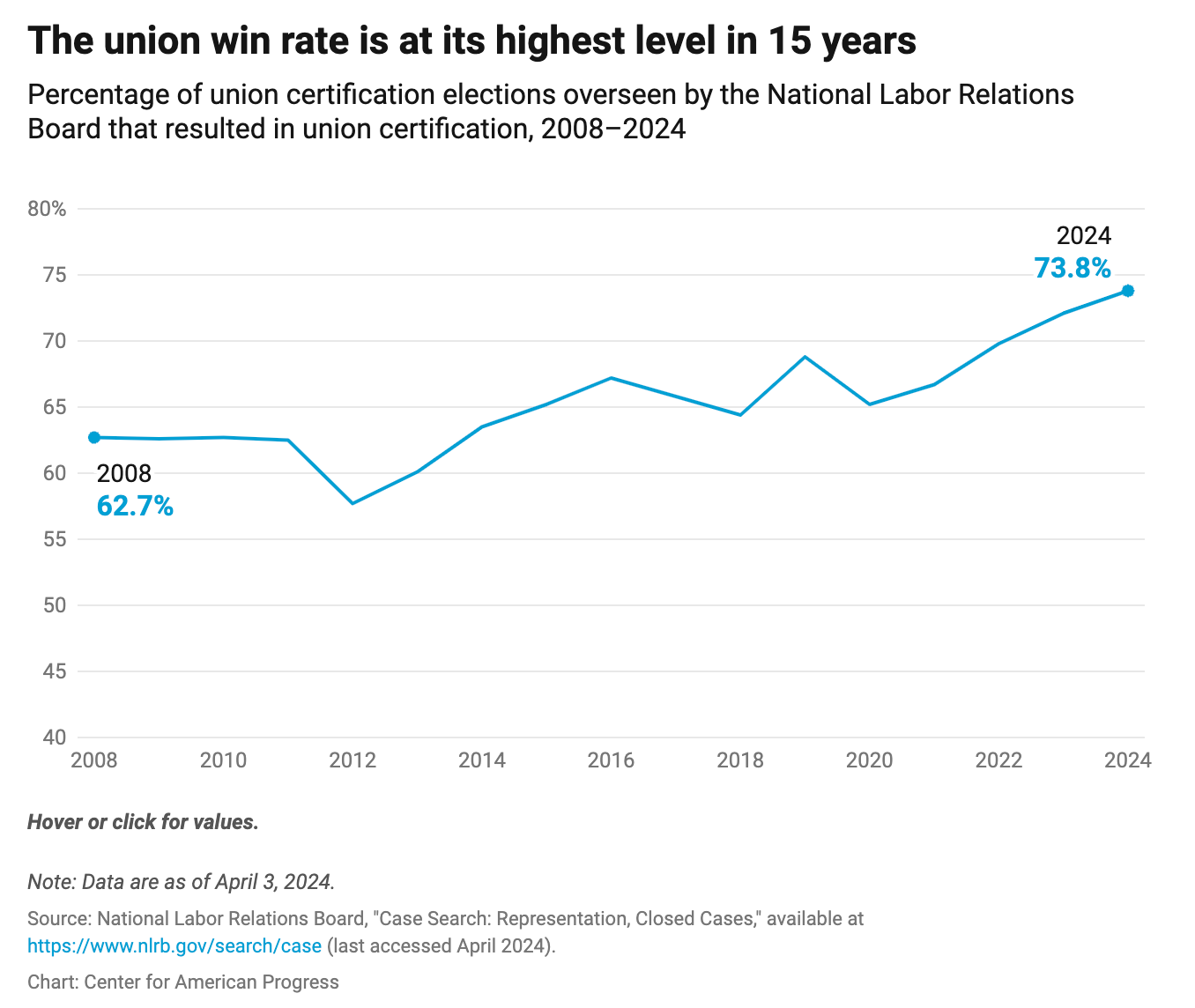Ballot initiatives offer progressive hope
Diving into this year's referenda. Plus, union wins and the little shoeshine person.
Welcome to a Thursday night edition of Progress Report.
The pace of news, my job reporting for More Perfect Union, and my health issue this year have made it a challenge to keep up with writing a timely and relevant newsletter, much less get rolling on any long-term projects. Not a complaint at all, just a reflection of reality.
Fortunately, I’ve been able to spend some time this week on the significant legwork required to move the ball forward on a ballot initiative project, which is the focus of tonight’s newsletter’s big story.
Note: To make this work as accessible as possible, I’ve lowered the price for a paid subscription back down to Substack’s $5 minimum. If you can’t afford that right now, please email me and I’ll put you on the list for free. Every paid subscription makes it easier for me to comp one while becoming sustainable.
1️⃣ Solidarity soaring: Not only are workers filing for more union elections, they’re winning them at the highest rate since 2009.
New data indicates that unionizing workers have won nearly 74% of their elections this year, representing a nearly 10 point swing since 2020. Last year saw the most union election petitions filed since 2010, coming just shy of 2000 requests overall.
It was a nice bit of affirmation when it emerged last year that polling found labor unions more popular than ever with the general public, but it was unclear whether that would translate to real worker organizing, which was an uphill task even before the Supreme Court’s recent decision. But as I’ve seen up close over these past three years, there is a new determination among workers to hold strong and hold employers accountable.
I’d attribute that new radical steadfastness to four main factors. First, essential workers who had to grind through thankless, high-risk jobs during the pandemic received little-to-no benefit from it beyond gratitude from self-serving corporate marketing campaigns. Delta workers, for example, told me this week that the disregard post-pandemic really lit a fire under them, and now several segments of the company are unionizing.
The growth also reflects a shift in who is unionizing. It’s been driven in large part by young, liberal college grads — graduate students, baristas, and other food service workers — who are both intellectually interested in democratic socialism and feeling like they have little to lose. The influx of young leftists has actually caused tension in some unions — this is a cyclical tradition going back to the 1800s — especially when it comes to issues like Gaza.
Finally, though federal labor law is still essentially toothless, a lot of credit does have to go to Biden’s NLRB, which has used every tool at its disposal — including creating new rules that have made early union-busting much more difficult — in a conscious effort to increase organizing.
2️⃣ Grounded: Here’s a good example of how the tables are turning for organized labor. Boeing spent 20 years cutting corners, squeezing the life out of its suppliers, and blackmailing its workers into increasingly shitty contracts. Now the company’s planes are synonymous with doors flying off mid-flight and it has to negotiate a contract with its unionized workforce, with whom the tables have definitively turned.
I reported and produced the piece above, which goes deep into the two-decade story of Boeing’s decline through the eyes of its workers. This time, instead of being up threatened into submission, the 32,000 members of IAM are demanding a big raise, better benefits and a much more significant role in production decisions. By blowing the whistle on all the shortcuts that the Boeing executives shoved down their throats over the years, they’re making it impossible to publicly justify spurning their input.
3️⃣ Unwound: Now that people are beginning to dig through more than the (scary) anti-democracy stuff in Project 2025, some of the gruesome economic details are beginning to emerge. Among the most draconian suggestions is a lifetime cap on Medicaid benefits, which would leave millions of low-income Americans without access to medical care. That’s not an exaggeration, either — up to 18.5 million people would have their already meager insurance threatened under this plan.
4️⃣ Failure: Oklahoma Secretary of Education Ryan Walters is a far-right ideologue who has been destroying the state’s schools with privatization and fighting for more than a year to establish the first religious public school. He’s also an absolute idiot who hasn’t been able to log into his Department of Education’s website for two years because he lost the password, leading to a loss of federal funding.
5️⃣ Huffing fumes: New York Gov. Kathy Hochul’s approval rating now sits at 38%, the lowest it has fallen during her three years as governor. On the bright side, she’s probably locked down the support of the little shoeshine people.
After half a decade of progressives successfully harnessing direct democracy to pass good policy via ballot initiatives and state constitutional amendments, Republicans have finally caught up — not so much for using the process for their own policies, which would largely fail if put to voters, but in doing their best to prevent progressive ideas from qualifying for the ballot.
Fortunately, they have thus far largely failed to suppress important initiatives and amendments — in some cases, Republicans were just too incompetent to pull off the sabotage (see: Missouri), while in some others, courts wouldn’t let GOP officials block amendments. There have been some frustrations (Nebraska Republicans killed an anti-voucher initiative), but conservatives have mostly been able to delay qualification of initiatives they didn’t like, which can hinder the campaigns by running up legal bills and creating confusion among voters.
On a purely personal bureaucratic level, this also makes it way harder to put together a comprehensive list of key certified and proposed initiatives, so I’ll continue to update the list over the next days and months. If there are any very local initiatives happening near you that I should know about, please flag them for me!
A majority of the relatively small slice of media coverage devoted to direct democracy has focused on abortion rights initiatives. In some places, activists are trying to codify existing reproductive rights into their state’s constitution (a New York appeals court just gave the go-ahead to such an amendment), while in other states, pro-choice coalitions want to overturn existing bans and safeguard their rights going forward. Protecting those rights is paramount, but Democrats also hope that these initiatives help to turnout voters who might otherwise be less motivated to go to the polls.
That strategy helped deliver several close elections to Democrats in 2022, including a clean sweep in Michigan that gave the party a trifecta for the first time since the 1980s. This year, there are up to 10 states that could have abortion rights on the ballot, and according to a new poll from KFF, 52% of Democratic women voters in those states with abortion initiatives say they are more motivated to vote than normal. On the other hand, 57% of Democratic women in other states say they are either feeling less motivated than usual or the same level of motivation as that they felt in past elections.
Even more stark is how Democratic women compare to Republican women, both in those states and everywhere else.
Arizona and Nevada are especially important to Democratic hopes; the Democratic candidates currently lead in close Senate and House races in both of those states, while Biden lags behind in each.
Republicans are even more explicit with their GOTV-focused initiatives. At least five states (thus far: IA, ID, KY, MO, OK) are going to ask voters to affirm that only US citizens can vote in federal elections, which is of course already specifically delineated in the US constitution.
Arizona Republicans also want voters to authorize the state to arrest suspected undocumented immigrants and deport them, which violates the separation of powers in the US constitution — at least for now. Who knows whether that’ll change once the Supreme Court inevitably hears a case about a similar law in Texas.
I’m also seeing some solid, if incremental, progressive taxation and redistribution proposals making their way to the ballot.
Voters in Oregon will likely have the chance to enact the first statewide Universal Basic Income, and one driven by a tax on corporate profits at that. It’d provide $750 a year based on the current formula, and while that isn’t all that much money, the precedent it would be a major win.
While not a UBI program, Baltimore, MD would lay down a nice marker should its residents agree to establish a Baby Bond program that would provide $1000 to the parents of every child born in the city. Massachusetts could allow Uber and Lyft drivers to unionize, and in Nevada, well, slavery may finally be outlawed.
Also noteworthy: The City Council in Richmond, CA voted unanimously to put advance an initiative that would tax Chevron for the ongoing pollution that is produced by the oil refinery on the city’s shore. The proceeds — estimated to be between $60 and $90 million per year — could be used in a lot of ways, but someone would likely be set aside to deal with the refinery when Chevron is done using it.
There are a lot more measures to comb through, and again I’ll be adding more over the coming weeks.
Wait, Before You Leave!
Progress Report has raised over $7 million dollars for progressive candidates and causes, breaks national stories about corrupt politicians, and delivers incisive analysis, and goes deep into the grassroots.
None of the money we’ve raised for candidates and causes goes to producing this newsletter or all of the related projects we put out. In fact, it costs me money to do this. So, I need your help.
For just $5 a month, you can buy a premium subscription that includes:
Premium member-only newsletters with original reporting
Financing new projects and paying new reporters
Access to upcoming chats and live notes
You can also make a one-time donation to Progress Report’s GoFundMe campaign — doing so will earn you a shout-out in the next weekend edition of the newsletter!








